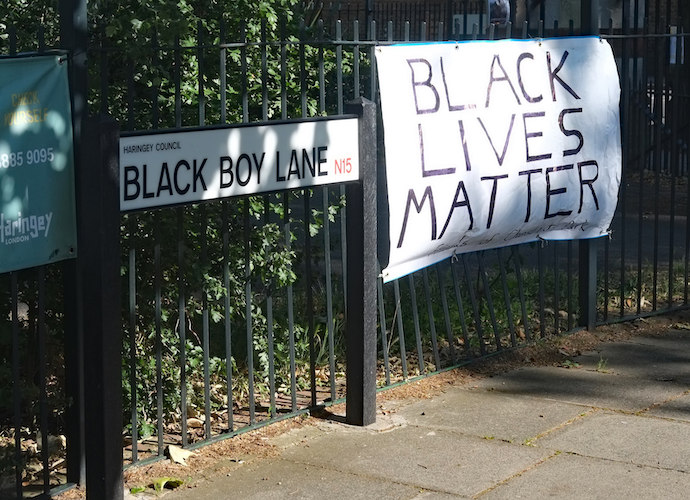Haringey Council has pushed through a name change for Black Boy Lane in south Tottenham after some 20 months of deliberation, despite residents opposing the move by a margin of more than eight to one. It will now be called La Rose Lane after John La Rose, activist and founder in 1966 of Haringey’s New Beacon bookshop
It was in June 2020, in the wake of the George Floyd murder, the emergence of the Black Lives Matter movement and the toppling of the Colston statue in Bristol, that the council’s then leader Joseph Ejiofor pledged to change the name.
The pledge was predictably controversial, with a discussion on popular local forum Harringay Online attracting a record number of comments. The council’s local history museum concluded that the street was named after a now closed local pub on a site where a “Black Boy” alehouse had been recorded as far back as 1690, though its exact origins were unclear.
The name is often held to derive from a nickname for Charles II, though slave trade or colonial connotations have also been suggested and the Haringey pub’s sign had featured a caricature grass-skirted black child. That sign was replaced after a local campaign in the 1980s and the pub was renamed before its closure a decade ago.
Whatever its origins “meanings change over time”, said Ejiofor. “The term ‘black boy’ is now used most commonly as a derogatory name for African heritage men.” He was sure it had to change.
Informal consultation suggested residents weren’t so sure, and not particularly keen either on council plans to name the road after either La Rose or Dame Jocelyn Barrow, educationalist, equalities campaigner and the first black female BBC governor.
The statutory consultation conducted in early 2021 showed 72 per cent of residents who responded saying no to a name change. Although some said the name was offensive and caused distress, more disagreed or reported it did “not have a significant impact on their day-to-day life”.
Residents elsewhere in Haringey supported the change however, prompting councillors to ask again. The second consultation, targeted more directly at residents of the street, was even more conclusive – 78 per cent of all respondents and 81 per cent of Black Boy Lane residents were against a change.
The main reasons for opposing the change, officers reported to this week’s corporate committee, the ultimate decision-maker on street naming, were “first that the council was seeming to push an agenda and second that it should focus on service provision instead”.
That left the committee with a “finely-balanced” decision. Retaining the name would recognise residents’ strength of feeling, but would also keep in place a name “found to be offensive” to borough residents more widely and visitors.
“The catalyst for the consideration of this renaming was the establishment of the commission on diversity in the public realm by the Mayor of London,” officers reminded councillors. Not going ahead “would not capitalise on the momentum created by the Black Lives Matter movement and the resultant calls to action across the private and public sector…prompting questions: ‘if not now, then when?’.”
Ejiofor, who had led calls for the name change, welcomed the decision, saying that it would “change the atmosphere” in which the challenge of inequalities was faced. “A journey of a million miles starts with just a single step,” he tweeted.
But the decision, which went through with the backing of two Liberal Democrat councillors while two Labour members abstained, was met with a muted reaction from senior councillors including Ejiofor’s successor as leader Peray Ahmet and deputy Mike Hakata.
“Under the Haringey Council constitution the corporate committee have the power to rename roads. The committee have taken that view after considerable consultation and we must respect that decision,” said Ahmet.
“As part of our commitments to tackling systematic inequalities and responding to the Black Lives Matter movement we will work alongside residents and stakeholders to celebrate our diversity through commemoration, public artworks, education and more. A road name change is only a small aspect of the bigger picture.”
Hakata, who had argued for a wider approach at an earlier meeting of the committee, said that changing the name, while an “important step”, did not change the structures of inequality.
“As a local black councillor, I must ask, have we done enough? Have we invested enough? The answer is simple – we need to do more, invest more, and with urgency, in collaboration with the black population of our borough whose lives matter not only in name but in action.”
Haringey Mayor Adam Jogee said that the name change “must be part of a wider, properly funded plan to bring our community together”, while another Labour councillor warned that a decision opposed by 81 per cent of those affected could risk “bringing the council into disrepute”.
The decision will come into force next year, with a £300 payment to all households and businesses affected. The total cost of the name change is estimated at £186,000.
On London is a small but influential website which strives to provide more of the kind of journalism the capital city needs. Become a supporter for £5 a month or £50 a year and receive an action-packed weekly newsletter and free entry to online events. Details here.
